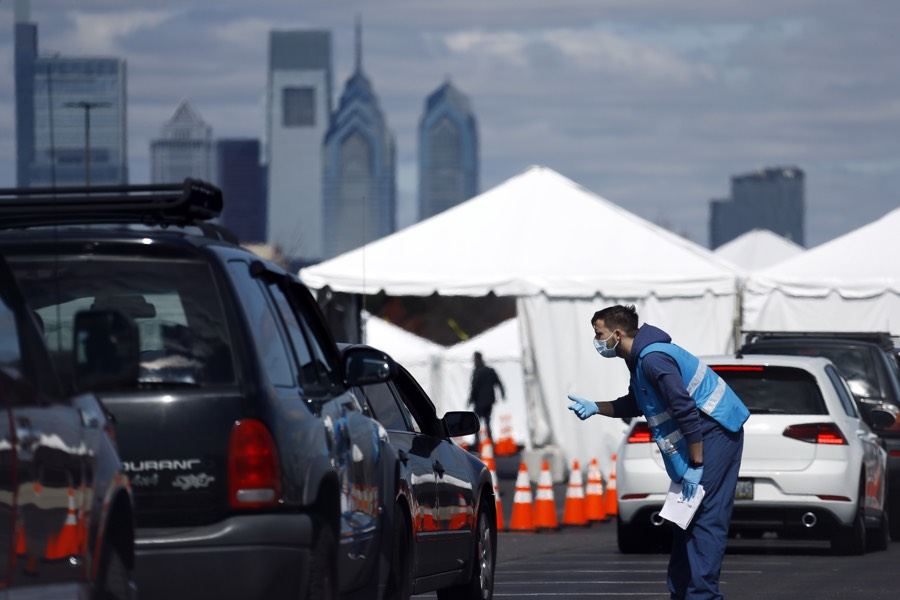Millennials and Gen Z Make Up Philly’s Largest COVID-19-Positive Group. We Need to Take This Seriously.
If you're between the ages of 20 and 39 and not already deep into Netflix and chill, now is the time.

A healthcare worker talks with Philadelphians waiting to be tested at a COVID-19 testing site near Citizens Bank Park. (AP Photo/Matt Slocum)
This is not a drill: Young Philadelphians, we are screwing this up.
According to coronavirus data released by the Department of Public Health on Wednesday, 342 Philadelphians had tested positive for COVID-19. What is even more alarming is that a staggering 163 of those cases are Philadelphians between the ages of 20-39.
Yes, nearly half of the Philadelphians who have tested positive for COVID-19 come from a cohort made up of millennials and gen Z.
As a millennial who hates reading articles that blame my generation for disrupting the status quo, this is that rare occasion where I’m in agreement with the naysayers. I can’t help but shake my head when thinking of these past few weekends when Philadelphians were still partying for St. Paddy’s Day as others were urging us to #StayTheFHome, or how we took advantage of this past weekend’s spring weather — social distancing be damned. It wasn’t just young Philadelphians. But there were a lot of us out there.
It’s not a stretch to think that some of the same folks who were out partying and cavorting are now testing positive and were spreading the virus unknowingly. If careless behavior continues, the pandemic will take longer to die down. The infection curve will not flatten. Young Philadelphians, we are not immune. We are getting the coronavirus.
Don’t believe me? According to the surgeon general, “this week, it’s going to get worse.” As people ignore calls to wash their hands, or stay at home, or keep their distance from others, they are making it more likely that they and others will contract the virus. Even worse, while younger people may be less likely to die from COVID-19 — our elders and those with compromised immune systems are more likely to.
“Many believe that this is a disease that only affects the elderly and we are seeing younger people not take this seriously,” says City Councilmember Isaiah Thomas, a millennial. “We are not invincible and this disease does not discriminate.”
If you’re like me, you bristle at arguments (and outright lies) that the younger generations are self-centered; yet by tempting fate and socializing in the middle of a global pandemic, you give ammo to the pundits. As some elders have said to me during this health crisis, if they could do their part by being drafted into the army during war, we can do our part and Netflix and chill during this pandemic.
Another alarming thing to consider is the possibility that you could have an undiagnosed pre-existing condition that might be exacerbated by the coronavirus. Most of us don’t get regular check-ups and while you might feel generally healthy, why would you risk finding out you have such an underlying condition in this, the worst possible way?
I was reminded of this when Streets Dept. founder Conrad Benner made a similar plea to fellow younger people: “Don’t host dinner parties. Don’t go on Tinder dates. Don’t have picnics in the park.”
“One of my biggest worries with COVID-19 (and I have many) is the number of younger people who likely don’t know they have an underlying health condition who are maybe playing a little fast and loose right now with all these stay-at-home orders,” Benner posted on his Instagram page on Monday night when he shared the story of how, three years ago, he discovered he had hypertension, a condition that could increase the risk of death with COVID-19. “Settle in as much as you can for the time being. Otherwise, you honestly do not know who you might be putting at risk.”
Look, nobody understands the need to socialize and connect more than I do, but I couldn’t agree with Benner more. Right now, let’s just do the right thing — even if it’s not the “coolest” thing to do. In the aftermath of a global crisis like this, nobody is going to remember the people who had fun; they’re going to remember the ones who turned things around to save everyone else. Let’s be the latter.


